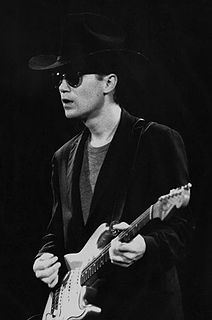
Marshall Howard Crenshaw is an American musician, singer, songwriter, and guitarist best known for hit songs such as "Someday, Someway," a US Top 40 hit in 1982, "Cynical Girl," and "Whenever You're on My Mind." His music has roots in classic soul music and Buddy Holly, to whom Crenshaw was often compared in the early days of his career, and whom he portrayed in the 1987 film La Bamba.
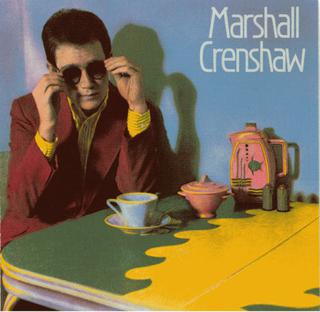
Marshall Crenshaw is the debut studio album by American musician Marshall Crenshaw. It was released on April 28, 1982 by Warner Bros. Records. Crenshaw, a performer in the musical Beatlemania, had begun to write songs for the album while staying in New York. The album was recorded with his backing band and producer Richard Gottehrer, engineer Thom Panunzio, and second engineer Jim Ball.

Good Evening is a 1989 album by Marshall Crenshaw. Although critically well-received, it failed to chart.
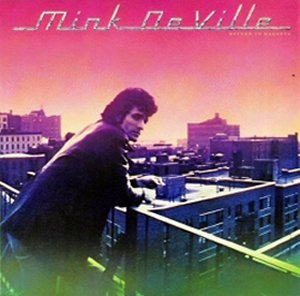
Return to Magenta, issued in 1978, is the second album by the rock band Mink DeVille. The album was the last to feature all the original members of the band. For this album the band was joined by Rock and Roll Hall of Fame member Steve Douglas on sax and Dr. John on piano, who would later collaborate with leadsinger Willy DeVille after his move to New Orleans.

"You're My Favorite Waste of Time" is a song written and first released by American singer Marshall Crenshaw. His 1979 home demo of the song was released as the B-side of his 1982 hit "Someday, Someway" and is available on his compilations The 9 Volt Years and This Is Easy: The Best of Marshall Crenshaw.

"Soldier of Love ," also known as "Soldiers of Love," is a 1962 song written by Buzz Cason and Tony Moon It was originally recorded by soul artist Arthur Alexander and released as a B-side of the single "Where Have You Been ", which reached #58 in the Billboard Hot 100 in June 1962. The song was later covered by The Beatles during a 1963 session at the BBC, that is available on the 1994 album Live at the BBC. It was also covered by The Kaisers, Marshall Crenshaw, Pearl Jam and The Derailers

Field Day is the second album by American rock musician Marshall Crenshaw. Recorded quickly after the moderate success of his self-titled debut album, Field Day featured a change in style and production after Crenshaw switched producers from Richard Gottehrer to Steve Lillywhite. The recording of the album was remembered positively by Crenshaw as was the album's sound.

Under the Covers, Vol. 3 is the third collaboration between alternative rock artist Matthew Sweet and Bangles singer/guitarist Susanna Hoffs. Released by Shout! Factory on November 12, 2013, it contains 14 cover versions of songs from the 1980s.
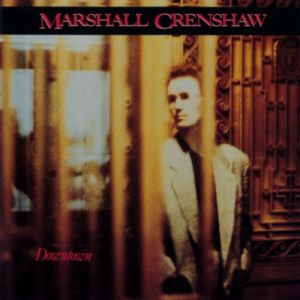
Downtown is the third album by singer/songwriter Marshall Crenshaw. Recorded after the relative failure of his album Field Day, Downtown was a departure from his previous albums due to its more rootsy sound.

Mary Jean & 9 Others is the fourth album by singer-songwriter Marshall Crenshaw. The album was produced by Don Dixon, who co-wrote the track "Calling Out for Love " with Crenshaw.

Life's Too Short is the sixth album by singer/songwriter Marshall Crenshaw.

Live …My Truck Is My Home is a live album by singer/songwriter Marshall Crenshaw, which includes performances from 1982 to 1994.

Miracle of Science is the seventh studio album by singer/songwriter Marshall Crenshaw, and his first studio effort for the indie imprint Razor & Tie. Crenshaw produced the album and played most of the instruments.

This Is Easy: The Best of Marshall Crenshaw is a greatest hits album by singer-songwriter Marshall Crenshaw. It was released in 2000 on Rhino Records. It includes twenty songs from Crenshaw's first seven studio albums and two tracks originally released on singles: "Something's Gonna Happen", a 1981 single on Alan Betrock's Shake Records before Crenshaw's major label debut, and "You're My Favorite Waste Of Time", the B-side of Crenshaw's biggest hit, "Someday, Someway". The compilation was produced by Gary Stewart and Crenshaw.

I've Suffered For My Art…Now It's Your Turn is a live album by singer/songwriter Marshall Crenshaw. It was recorded at the fabled venue The Stone Pony in Asbury Park, N.J. on February 16, 2001. It includes many of Crenshaw's best known songs, four tunes from his most recent studio album, #447, and a pair of vintage covers; Jody Reynolds' "Endless Sleep" and The Left Banke's "Walk Away Renée". The acoustic show was performed by Crenshaw solo but for a few songs accompanied by bass and accordion.

"Someday, Someway" is a 1982 song by American rock musician Marshall Crenshaw. The song was released on his 1982 debut album, Marshall Crenshaw.

"Whenever You're on My Mind" is a 1983 song by American rock musician Marshall Crenshaw. The song was released on his 1983 album Field Day. The song, notable for its booming production, originally was written during the making of Crenshaw's debut album but was saved for his second album release. Crenshaw felt the song was his best to date, and the song was released as Field Day's first single.
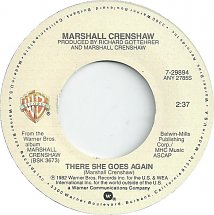
"There She Goes Again" is a 1982 song by American rock musician Marshall Crenshaw. The song was released on his 1982 debut album, Marshall Crenshaw. Lyrically, the song was written about seeing a girl from one's window as she passes by in a car, an image that Crenshaw later said was inspired by his youth.

"Cynical Girl" is a 1982 song by American rock musician Marshall Crenshaw. The song was released on his 1982 debut album, Marshall Crenshaw. Written as a satire on the "mass culture" that Crenshaw disliked, the song was not based on a specific girl.
"Mary Anne" is a 1982 song by American rock musician Marshall Crenshaw. The song was released on his 1982 debut album, Marshall Crenshaw. Written from the perspective of trying to console someone, the song's title was not based on a specific girl. The song's hook was described by Crenshaw as going for a "hypnotic" effect and the song features layered 12-string guitar parts.



















